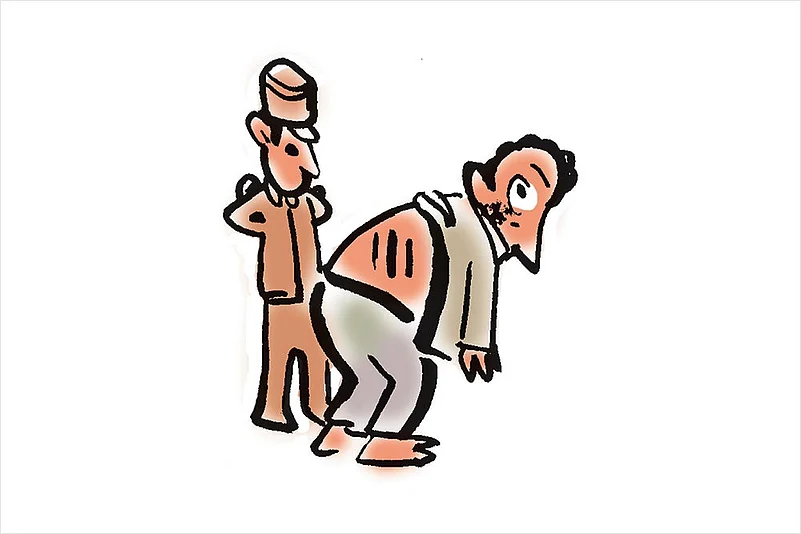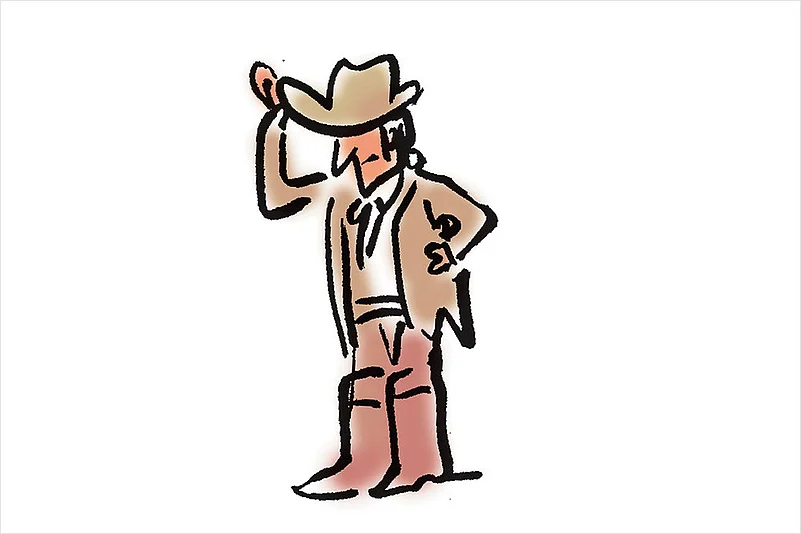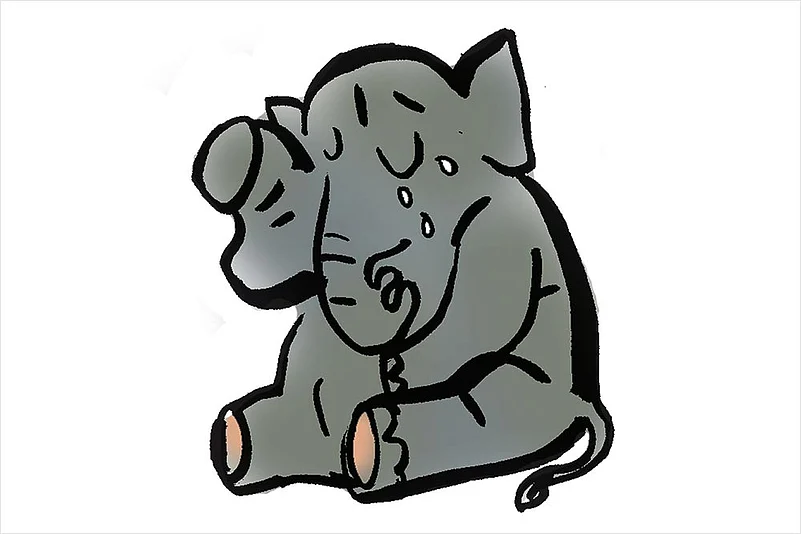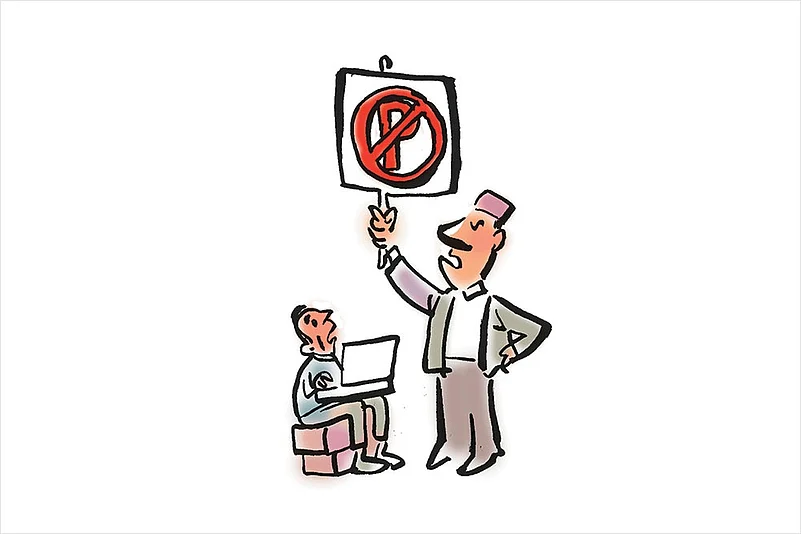Porno Embargo
The Nepalese government has courageously waded into the recesses of the vulgarian’s internet, ordering service providers to block more than 24,000 pornographic websites. In a statement, it said, “Easy access to porn and vulgar content has affected our social values and social harmony, and it has encouraged sexual violence.” This crackdown comes as a response to protests and public anger following the rape and murder of a 13-year-old girl in July, with the state being accused of neglect in pursuing rape cases. Activists derided the move as ‘ridiculous’ and failing to address the real problems facing victims who seek justice, while one service provider’s CEO told reporters, “There are many back-end ways to reach these sites. It’s not a very effective way of doing things.” One would have thought the back-end ways would have come under the ban.

Philanderer’s Prescription
A smack (or fifty) with a broom may not be enough to keep the doctor away. A physician in Colombo complained to the police that his wife had beaten him until her broomstick was broken. A terrible and uncalled-for assault, especially when one considers that he’d only come to take their two-and-a-half-year-old child to live with his second paramour (out of five). His thirteen children, including three born in wedlock, were all ensconced with their respective mothers, but this arrangement was clearly not to his satisfaction. The durable doctor succeeded in his quest despite the violence, and the police had to mediate in order to take the child back to the wife.

Fugitive Justice
He’s on the run from the law and has sought asylum overseas, while blasting his country’s government with a tome of invective. And incidentally, until November, Surendra Kumar Sinha was the chief justice of Bangladesh—the first Hindu to serve in the role. Embroiled in a dispute with Parliament over a constitutional amendment that would allow legislators to impeach judges, Sinha had no choice but to go on leave and embark on a tour of foreign countries. He submitted his resignation from Canada 81 days before his term expired. Now in the US, he has launched a book full of allegations against the government, including the claim that he was forced to “leave the country, resign” and was “exiled”. The government, for its part, is investigating a number of corruption charges that a spurned Supreme Court brought against Sinha after his exit.

High Noon In Rangoon
The Wild West, unlike poverty, is a state of mind—and, with Injuns just across the border, there’s nothing terribly surprising about encountering a cowboy in a make-believe Yangon salon. Ko Thar Nge, a 47-year-old assistant manager at an online security company, winds down after his 10-hour shifts at work by feasting his eyes on his impressive array of cowboy paraphernalia. “I feel calm and relaxed when I see my collection,” he was quoted as saying. Built up over two decades, the collection features leather boots, belts, silver buckles, bolo ties, hats, rodeo shirts, whips, leather coats, vintage jeans and Native American head-dresses. We assume he’s also a dab hand at the lasso!

The Weeper’s Dozen
It’s not all mumbo jumbo—elephants do mourn their dead. When a newborn calf died on a paddy field in Sakleshpur taluk in Karnataka’s Hassan district, the mother stood vigil, caressing her child’s body. She was soon joined by a number of elephants from the herd. Deputy conservator of forests Sivaram Babu said, “Around 12 elephants are close to the spot where the calf was found.” He added that his team was waiting for them to leave on their own before taking the body of the calf for an autopsy. It was a well-attended funeral of man-animal conflict, with more than 40 elephants, in different groups, having been spotted in the taluk recently.
China Cut Pak President
It’s exactly what you think it is. ‘China cutting’ is the land mafia’s practice of carving out and selling small parts of a big plot of land—often government land like parks, but also private property. Karachi seems to be a hotbed of this, with one victim being Arif Alvi, President of Pakistan. A 400-square-yard plot Alvi bought for Rs 50,000 in 1978 was sold off through China cutting, with a house being built on it in 2011. In 2017, Alvi petitioned the Karachi Development Authority for its recovery, while alleging connivance of corrupt KDA officials. The plot remains in ‘mafia’ hands.
Bhutanese Siamese
Two sisters, joined not at the hip but at the stomach, have flown to Australia to be separated. The operation to separate Bhutan’s first recorded conjoined twins, 14-month-olds Dawa and Nima Pelden, won’t be cheap at around $1,80,000. But Children First, a Melbourne-based charity, has raised the necessary funds. CEO Elizabeth Lodge said, “The girls are getting a bit frustrated with each other, as you would at 14 months. Like any siblings, they’re getting cranky, so (their) mom’s looking forward to the operation.” A specialist team has been assembled, and doctors are examining the twins in order to formulate an appropriate plan for the procedure, which is expected to be a lengthy one.

No Equality, No Talks
The last-minute cancellation of talks between foreign ministers of India and Pakistan on the UNGA sidelines last month continues to encourage different sections of observers in the two countries to come up with their own explanations. An interesting one that seems to be gathering ground in certain Pakistani circles puts it that India’s growing confidence and arrogance led to cancellation of the talks.
Until recently, most Pakistani observers believed the November assembly elections in some crucial Indian states and the 2019 Lok Sabha polls stood in the way of the talks. Since India felt the scheduled talks in New York may not yield much, it had decided to call it off, rationalised most India-watchers in Pakistan.
Now, India’s “arrogance and confidence” seems to be the dominant aspect that most observers feel would define future India-Pakistan relations.
Columnist Moeed Yusuf writes in Dawn about Delhi’s new attitude, “It is far more confident, if not arrogant, and fixated on the country’s upward trajectory.” He quotes Pakistani observers saying, “There are regular references to the growing economic and military differential between India and Pakistan and to comparisons with Nepal and Bangladesh when Pakistan is referenced.” They added, “the mindset doesn’t reflect an India that feels a need to compromise with Pakistan anymore.”
Accepting the bottomline about India’s focus on the growing power imbalance in the region, Yusuf argues that if India can continue growing economically and diverting significant resources to defence while forcing Pakistan to remain wedded to a paradigm that prizes hard security over economic well-being, in a decade or two the power differential will be so large that the only negotiation possible would be on the stronger party’s terms. Yusuf thinks a smart policy is needed to engage with India that must be predicated on improving oneself, not on hoping for the opponent’s failure. Pakistan must proactively figure out how it can rejig the deteriorating equation vis-a-vis India.
He suggests two ways. First, Pakistan needs to continue offering India dialogue and be prepared for serious negotiations on all issues, regardless of India’s responses. Precisely because India wants to remain on the good side of the global narrative, it will, sooner or later, have to acquiesce to talking. Second, Pakistan needs to reorient its thinking from geo-security to geo-economics. But given the current mood in both nations, is anyone willing to listen to this sage advice?
Illustrations by Sajith Kumar


























